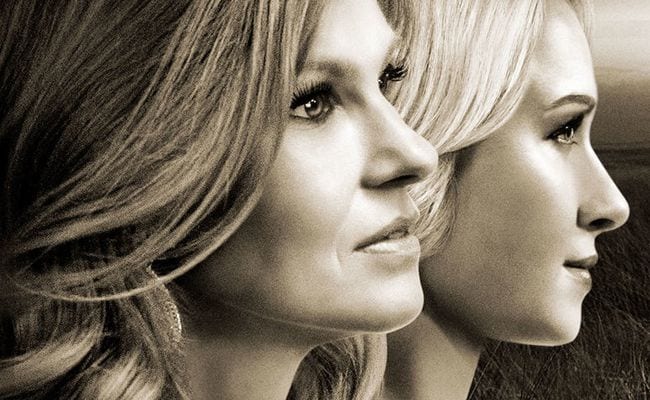
The new season premiere of ABC’s Nashville opens and closes with Rayna Jaymes (Connie Britton). As the emotional core of the series for two and half seasons, the 40something queen of country has worked to reinvent herself in the face of new young things snapping at her heels. We’ve admired Rayna’s refusal to hang up her rhinestones just yet. We’ve believed in the integrity of her struggles to do the right thing for all those involved in her complex personal life. But while the new episode, the season three winter premiere “I’m Not That Good at Goodbye”, confirms her centrality, it also links her to other women in the show in ways that point to a reconfiguration of their relationships as well as the series’ challenge to genre categorizations.
The episode picks up the threads of the mid-season cliffhangers: drug-overdosed Layla (Aubrey Peeples) is unconscious in the swimming pool; Sadie (Laura Benati) is abused by her ex-husband; and Deacon (Charles Esten) faces serious illness. The potential excesses of these plotlines are played out in a minor key. Nashville is all about restrained emotional responses to the ripple effects of these events on the characters.
In the opening scene, the camera lingers on Rayna’s face as she drives away from Luke’s (Will Chase) mansion. Britton is beautiful; she also has lines on her face. Throughout the series, this alone has helped her define Rayna’s sensitivity within an industry that celebrates youth. Here, in just a few seconds, her face registers the weight of what she’s done, the damage done to others, and the potential damage averted to her. Our sympathies are with Rayna. She’s done what most if not all viewers wanted her to do since she picked Luke (Will Chase) over Deacon. Luke has had many unlikeable moments, from his petty jealousy of her professional success and his prenuptial agreement to his plan to shunt her girls off to boarding school, so we have no illusions that he will go gently into the twilight of rejection.
Rayna can’t indulge in her feelings, even while we feel with her and for her. The demands of being a star in a media industry mean that she needs to “take control of the story” before Luke does, as her manager Bucky (David Alford) advises. So Rayna addresses the waiting paparazzi, striding out to confront them with a dignified statement, without changing her clothes or doing her hair or makeup. As the day ends, and she curls up silent and alone in a fetal position in bed. Her moral legibility is defined by a type of corporeal sincerity.
At the same time. Juliette (Hayden Panettiere) and Avery (Jonathan Jackson) adjust to their first day of married life. Her pregnant body (the show incorporates Panettiere’s real-life pregnancy) and unmade-up face mark how far she has come from the glamorous spoiled bitch of Season One. Throughout the pregnancy, we’ve seen Juliette becoming less self-centered. Here her earthbound body gives her a new authenticity and grounds her deeper feelings. Her intergenerational conflict with Rayna shifted gears when the older star mentored the younger one. Now we get a sense that Juliette might be ready for some role reversal.
Sadie’s (Laura Benati) black eye extends the episode’s focus on female bodies, and helps her make a connection with another woman. The selfie she takes reminds her and us of her fragility, but it is also a visual testament that she won’t let it happen again. Of Nashville’s leading ladies — and she is joining our reigning duo — Sadie is the only one who sings in this episode. Strumming her guitar at home, she acknowledges that she’s “been broken”, but resists being defined by “a sad song”.
Luke, on the other hand, gets to do a big production number. Of course, they are all country singers, and we’ve seen the women perform in public countless times. Here, the contrast with the domestic intimacy and deep feeling of Sadie’s song only serves to confirm his inauthenticity.
Nashville is a feminocentric, even feminist show. From its female creator (Callie Khouri), showrunner (Dee Johnson), and this episode’s director (Jan Eliasberg) and writer (Debra Fordham) to its protagonists, this is a woman’s world. Women are the backbone of the series and the objects of our moral allegiance; it offers no black and white heroes and villains. Even label boss Jeff Fordham (Oliver Hudson) turns out to have a softer side in his attachment to Layla. But the men we care most about, like Deacon and Avery, earn our affection through their relationships with our heroines. Indeed, Deacon’s illness both makes him vulnerable and allows him to display the integrity he shares with the female leads.
Nashville did not make it on to PopMatters‘ “Best TV of 2014”. Despite the show’s multiple awards, it appears on TV’s soapiest network. Critics persist in calling it “sudsy”, even if such observations are qualified (Hollywood Reporter calls it a “grown up soap”). While the politics of denigrating soaps is complicated, Nashville is no conventional melodrama. It lacks the excessive emotionalism, aesthetic ornamentation, intense nondiegetic music (except around the ad breaks), and spectacle that are central to the genre. Nor does it offer campy, ironic pleasures.
Just watch and listen to the spare simplicity of Rayna’s declaration to Deacon. This is authenticity embodied. It evokes what Linda Williams, in “Mega-Melodrama! Vertical and Horizontal Suspensions of the ‘Classical’”, calls the “felt good” of new, horizontal modes of television melodrama. We’ll continue to invest in this sort of sincerity.

